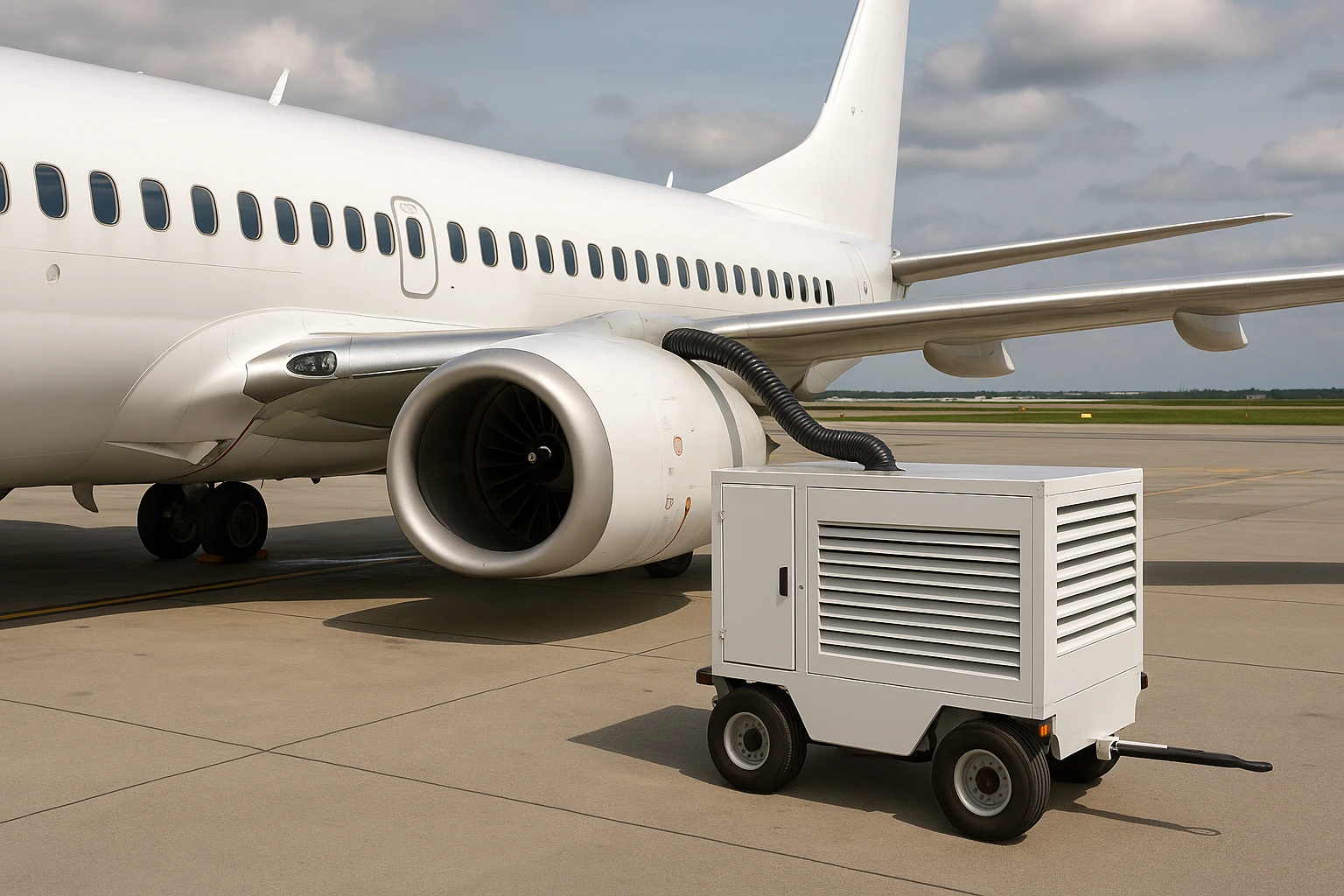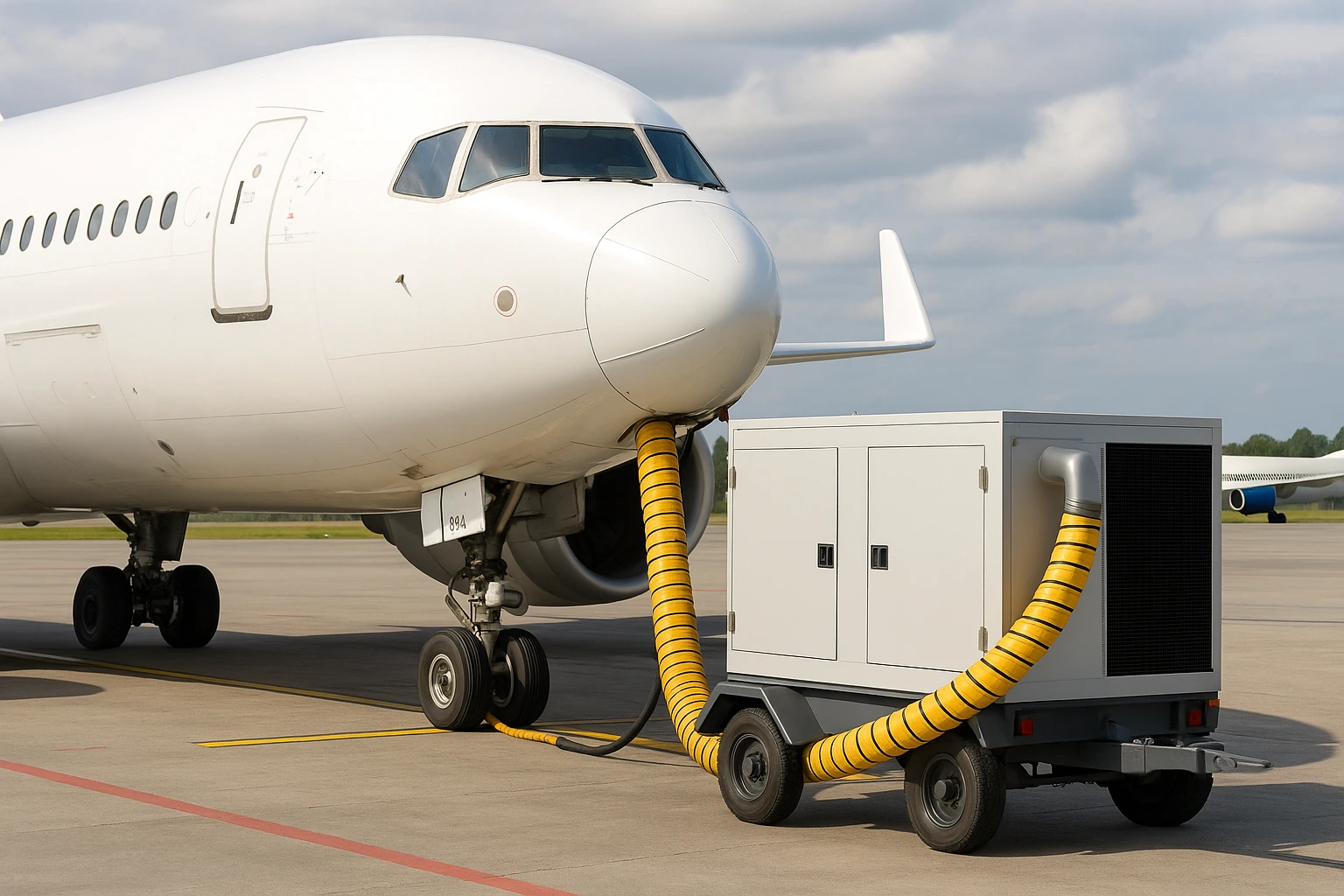Efficient aircraft ground cooling is an essential aspect of airport operations and airline passenger comfort. When aircraft are parked on the ground, their environmental control systems (ECS) cannot operate at full capacity without relying on auxiliary power units (APUs). This is where air compressors in airplane pre-conditioning units (PCA) play a crucial role, delivering conditioned air to cabins, maintaining optimal temperature and humidity, and reducing fuel consumption. Ground cooling systems are also essential for protecting sensitive avionics and minimizing turnaround times for flights.
Air Compressors Airplane Pre-Conditioning Unit: Efficient Aircraft Ground Cooling
This article provides an in-depth overview of PCA systems, including their components, types, applications, benefits, maintenance tips, and emerging trends in aviation ground support. All content is aligned with DrezAircon’s business intent, highlighting practical applications and real-world scenarios.
1. Introduction: What is an Air Compressors Airplane Pre-Conditioning Unit (PCA)?
An air compressors airplane pre-conditioning unit (PCA) is a specialized system used to supply conditioned air to an aircraft while it is on the ground. Unlike auxiliary power units, which rely on the aircraft’s engines, PCA units operate externally and provide a reliable source of temperature-controlled air. This ensures passenger comfort during boarding, maintenance work, or extended parking periods, while also protecting the aircraft’s internal systems.
PCA units are widely used at commercial airports and in remote airfields where energy-efficient, quiet, and reliable solutions are needed. The air compressor is the core component, pressurizing ambient air for delivery to the aircraft’s ECS. Modern units also integrate advanced refrigeration cycles and filtration systems to ensure air quality, temperature stability, and optimal humidity levels.
Airports and airlines increasingly adopt PCA systems to reduce fuel usage, lower emissions, and minimize reliance on onboard APUs, which are costly to operate and maintain. By implementing a well-designed PCA system, operators can save significant operational costs while maintaining high standards of comfort and efficiency.
2. Key Components of a PCA System
Understanding the components of a PCA system helps explain how these units deliver efficient aircraft ground cooling.
Air Compressors
Air compressors are the primary mechanism that pressurizes ambient air to the levels required by the aircraft’s ECS. Most modern PCA units utilize scroll compressors or screw compressors, which are known for their efficiency, reliability, and low maintenance. Compressors ensure a continuous supply of pressurized air, which is critical for cooling larger aircraft cabins or supplying multiple aircraft simultaneously.
Refrigeration Cycle and Air Cycle Machines (ACM)
Once compressed, the air passes through a refrigeration cycle or air cycle machine (ACM) to lower its temperature. PCA units can use vapor-compression or air-cycle cooling methods depending on design and capacity. These systems allow ground support staff to precisely control the temperature delivered to the aircraft cabin. Large-capacity PCA units, such as those used for wide-body aircraft, rely on ACMs to provide uniform cooling across the entire cabin.
Filtration and Dehumidification
Air quality is paramount. PCA units include multi-stage filters to remove dust, pollen, and other airborne particles. Dehumidification systems prevent condensation, which could damage avionics or cabin furnishings. Maintaining proper humidity levels also ensures passenger comfort and reduces potential health risks during boarding or pre-flight maintenance.
Control Systems
Modern PCA units incorporate automated control systems to regulate airflow, temperature, and pressure. Sensors continuously monitor environmental conditions, adjusting compressor output and refrigeration to maintain the desired cabin climate. Advanced units may include remote monitoring or integration with airport management systems for predictive maintenance and real-time alerts.

3. Types of PCA Units for Aircraft
PCA units vary based on power source, mobility, and capacity, allowing airports and operators to select the most suitable solution.
Electric-Driven PCA Units
Electric PCA units are ideal for airports with stable electrical infrastructure. They operate quietly, reduce local emissions, and offer precise control over air conditioning. These units are often deployed at urban or high-traffic airports where noise and environmental regulations are strict.
Diesel-Driven PCA Units
Diesel-powered PCA units are suitable for remote airports or temporary airfields lacking reliable electrical supply. They provide high power output, mobility, and can be deployed quickly for emergency or temporary operations. Diesel units are commonly used in military applications, disaster relief missions, and temporary aviation facilities.
Noise-Reduced and Energy-Efficient PCA Units
Advancements in compressor technology and sound-dampening systems have produced noise-reduced PCA units. Energy-efficient units consume less power and refrigerant, reducing operational costs while meeting environmental standards. Airports adopting these units benefit from quieter operations and sustainable cooling solutions, improving passenger experience and regulatory compliance.
4. Applications of PCA Units in Ground Support
PCA systems are integral to modern airport operations. Their applications extend across various scenarios:
Airport and Runway Cooling Infrastructure
At busy airports, PCA units are part of the ground support equipment (GSE) fleet. They supply conditioned air to aircraft at gates, during boarding, or between flights. Fixed and mobile units ensure passengers remain comfortable while aircraft are on the ground.
Ground Cooling for Parked Aircraft
Parked aircraft, especially in warm climates, require continuous cabin pre-conditioning to maintain safe temperatures. PCA units prevent cabin overheating, safeguard avionics, and reduce the reliance on onboard APUs, lowering fuel consumption and maintenance costs.
Temporary or Remote Aircraft Operations
In remote locations or temporary airfields, diesel-driven PCA units are deployed to provide mobile cooling solutions. Military operations, disaster relief flights, and remote commercial airports benefit from PCA systems to ensure aircraft readiness and passenger comfort.
5. Benefits of Using Air Compressors PCA Units
Implementing PCA units provides measurable operational, environmental, and financial advantages:
- Efficient Cabin Pre-Conditioning: Units deliver consistent airflow and temperature control, ensuring comfort during boarding or maintenance.
- Reduced Fuel Consumption: By replacing APUs, PCA units reduce engine runtime and fuel costs, sometimes saving up to 40% during aircraft turnaround.
- Lower Maintenance Costs: Ground-based systems experience less operational stress compared to APUs, reducing wear and extending lifespan.
- Noise Reduction: Quieter operation improves the airport environment and meets regulatory standards.
- Environmental Advantages: Electric or hybrid PCA units reduce emissions, supporting sustainability initiatives and reducing the airport’s carbon footprint.
Case studies from international airports demonstrate that adopting PCA units significantly improves operational efficiency, reduces costs, and enhances passenger experience.
6. Choosing the Right PCA Unit for Your Aircraft
Selecting the correct PCA unit involves multiple considerations:
Capacity and Cooling Requirements
Aircraft size, passenger load, and turnaround time dictate the cooling capacity needed. Wide-body jets require high-capacity PCA systems, sometimes exceeding 20 tons of cooling, while regional aircraft may require smaller units.
Power Supply Considerations
Electric PCA units are ideal for airports with stable power infrastructure, while diesel-driven units provide flexibility in remote or temporary locations. Hybrid options are also available to combine the advantages of both systems.
Integration with GSE
Compatibility with existing ground support equipment is essential for seamless operations. PCA units should align with gate layouts, power connections, and vehicle movement paths.
Environmental Compliance
Noise, emission, and energy consumption regulations vary by airport. Selecting compliant PCA units ensures smooth operations without regulatory hurdles.
Manufacturers like DrezAircon offer tailored solutions to meet specific aircraft types and airport requirements, helping operators choose the most efficient and compliant PCA systems.

7. Maintenance and Operational Tips for PCA Systems
Proper maintenance ensures PCA units operate efficiently and reliably:
- Compressor Inspection: Check pressure output, lubrication, and vibration levels to prevent failures.
- Refrigeration System Checks: Monitor refrigerant levels, heat exchanger efficiency, and overall system performance.
- Air Filters and Dehumidifiers: Replace or clean regularly to maintain air quality and prevent condensation issues.
- System Testing: Conduct pre-operation checks for airflow, temperature control, and pressure to avoid operational delays.
Routine preventive maintenance reduces downtime, prolongs equipment life, and ensures regulatory compliance. Manufacturers provide detailed maintenance schedules and operational manuals for all PCA units.
8. Future Trends in Aircraft Ground Pre-Conditioning
Emerging technologies are shaping the next generation of PCA systems:
- Energy-Efficient and Sustainable Solutions: Electric and hybrid units reduce fuel consumption and carbon footprint.
- Smart PCA Units with IoT Monitoring: Sensors enable predictive maintenance, real-time alerts, and remote operation.
- Advanced Compressor and Cooling Technologies: Next-gen scroll and screw compressors deliver higher efficiency, quieter operation, and reduced operational costs.
- Integration with Airport Management Systems: PCA units can coordinate with gate assignments, aircraft schedules, and other GSE for optimized resource allocation.
Airports adopting these innovations benefit from lower operational costs, enhanced passenger comfort, and improved sustainability.
FAQS
1. What is an airplane pre-conditioning unit (PCA)?
A PCA unit is a ground support system that supplies conditioned air to aircraft while on the ground, reducing reliance on auxiliary power units (APUs) and maintaining cabin temperature and humidity.
2. How do air compressors work in PCA units?
Air compressors pressurize ambient air, which is then cooled or dehumidified before being delivered to the aircraft’s environmental control system (ECS). Scroll or screw compressors are commonly used for efficiency and reliability.
3. What are the main types of PCA units?
There are electric-driven PCA units, diesel-driven PCA units, and hybrid or energy-efficient models. Electric units are suitable for airports with stable power, while diesel units offer mobility for remote or temporary operations.
4. Why are PCA units important for airport operations?
PCA units provide consistent cabin pre-conditioning, reduce fuel consumption from APUs, lower maintenance costs, and improve passenger comfort during boarding, maintenance, or turnaround.
5. Can PCA units be used for large aircraft?
Yes. High-capacity PCA units are designed to handle wide-body aircraft and can deliver over 20 tons of cooling, ensuring uniform temperature control across the entire cabin.
6. How do PCA units contribute to sustainability?
Electric and energy-efficient PCA units reduce fuel consumption, lower greenhouse gas emissions, and comply with airport environmental regulations, supporting greener ground operations.
7. What maintenance is required for PCA units?
Regular inspection of air compressors, refrigeration systems, filters, and dehumidifiers is necessary. Preventive maintenance ensures operational efficiency, reduces downtime, and prolongs unit lifespan.
8. How do PCA units differ from auxiliary power units (APUs)?
Unlike APUs, PCA units operate externally and solely provide conditioned air. This reduces engine runtime, fuel consumption, and maintenance while offering precise temperature control.
9. Can PCA units be used in remote or temporary airfields?
Yes. Diesel-driven PCA units are ideal for remote locations, temporary airports, military operations, and emergency relief flights, providing mobile and reliable ground cooling solutions.
10. Where can I buy high-quality PCA units?
Airports and airlines can purchase reliable PCA units from manufacturers like DrezAircon, which offers a range of diesel and electric pre-conditioning units, technical support, and tailored solutions for various aircraft types.
Conclusion: Why Invest in High-Quality PCA Units
Air compressors in airplane pre-conditioning units are essential for modern aircraft ground support. They ensure passenger comfort, reduce fuel consumption, lower maintenance costs, and provide reliable cabin pre-conditioning.
Investing in high-quality PCA systems, such as those offered by DrezAircon, guarantees efficient and sustainable ground cooling solutions. By choosing the right capacity, power source, and integration, airports and operators can optimize operations, comply with environmental standards, and improve overall service quality.
For airports or airlines seeking reliable PCA solutions, DrezAircon provides a range of units designed to meet diverse operational requirements. Visit DrezAircon for product details, technical specifications, and consultation services to identify the most suitable PCA system for your aircraft fleet.




